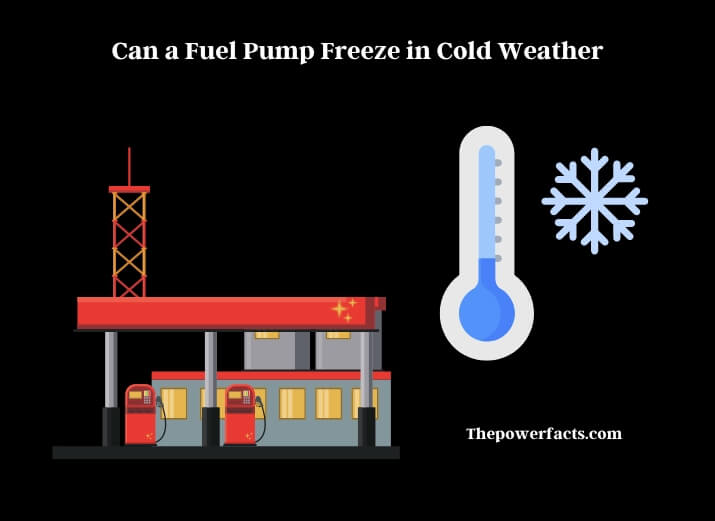As winter approaches, many drivers wonder if their vehicle’s fuel pump can freeze in cold weather. Here, we’ll dive into the inner workings of fuel pumps, the effects of freezing temperatures on them, and how to prevent and deal with fuel pump freezing issues.

Know the Fuel Pumps
Before we delve into the freezing aspects, let’s first understand what a fuel pump is and how it functions.
How Fuel Pumps Work
The fuel pump is a crucial component of your vehicle’s engine, responsible for transferring fuel from the gas tank to the engine. It ensures that your engine gets the right amount of fuel at the correct pressure, allowing it to function optimally.
Types of Fuel Pumps
There are two main types of fuel pumps: mechanical and electric. Mechanical fuel pumps are typically found in older vehicles with carbureted engines, while electric fuel pumps are used in modern vehicles with fuel injection systems. Both types can be affected by freezing temperatures, but electric pumps are generally more susceptible.
Freezing Temperatures and Fuel Pumps
Cold weather can have a significant impact on your vehicle’s fuel pump, and in some cases, it can even cause it to freeze.
Effects of Cold Weather on Fuel Pumps
In extreme cold, the fuel in your vehicle can become thicker and more viscous, making it difficult for the pump to move it efficiently. Freezing temperatures can cause any moisture in the fuel system to freeze, leading to ice formation in the fuel pump, lines, or filter, which can hinder or even block fuel flow.
Factors Contributing to Fuel Pump Freezing
Several factors can contribute to fuel pump freezing, including:
Water in the Fuel
Water can enter your fuel system from various sources, such as a contaminated gas station supply or a damaged gas tank. When temperatures drop, this water can freeze and cause problems for your fuel pump.
Condensation
Condensation can form inside your gas tank due to temperature fluctuations, leading to water accumulation in the tank. This water can then freeze, causing issues for your fuel pump.
Poor Fuel Quality
Low-quality fuel or fuel with a high water content can be more susceptible to freezing. Using good-quality fuel from reputable gas stations can help reduce the risk of fuel pump freezing.
Preventing Fuel Pump Freezing
To minimize the risk of fuel pump freezing, consider the following steps:
Regular Maintenance
Maintaining your vehicle’s fuel system, including regularly replacing the fuel filter, can help prevent the buildup of moisture and contaminants that could lead to freezing.
Fuel Additives
Using a fuel additive specifically designed to prevent freezing can lower the freezing point of any water in the fuel system, reducing the likelihood of ice formation. These additives can be found at most automotive stores and gas stations.
Parking Considerations
If possible, park your vehicle in a garage or a covered area during cold weather to help protect the fuel system from extreme temperature fluctuations. This can reduce the risk of condensation and freezing issues.
Dealing with a Frozen Fuel Pump
If you suspect that your fuel pump has frozen, here are some steps you can take:
Thawing Techniques
To thaw a frozen fuel pump, try one or more of the following methods:
- Apply gentle heat to the fuel lines and pump using a hairdryer or a portable heater. Be cautious not to use an open flame, as this can be dangerous around fuel.
- Place a magnetic block heater on the fuel tank to help warm the fuel and melt any ice that may have formed.
If the vehicle is in a safe location, wait for warmer weather to help naturally thaw the fuel pump.
When to Call a Professional
If you are unable to thaw your fuel pump, or if you have concerns about the safety of attempting it yourself, contact a professional mechanic. They have the tools and expertise to address frozen fuel pumps and other cold weather-related issues.
FAQs
Q1: Can a fuel pump freeze in cold weather?
Yes, a fuel pump can freeze in cold weather, particularly if there is moisture in the fuel system that turns into ice. This can hinder or even block fuel flow, causing problems for your vehicle.
Q2: What are the main factors that contribute to fuel pump freezing?
Water in the fuel, condensation, and poor fuel quality are the primary factors that can lead to fuel pump freezing.
Q3: How can I prevent my fuel pump from freezing?
Regular maintenance, using fuel additives designed to prevent freezing, and parking your vehicle in a sheltered area can help reduce the risk of fuel pump freezing.
Q4: How do I thaw a frozen fuel pump?
You can try applying gentle heat to the fuel lines and pump, using a magnetic block heater, or waiting for warmer weather to naturally thaw the pump. In some cases, it may be best to call a professional mechanic for assistance.
Q5: Are electric fuel pumps more susceptible to freezing than mechanical ones?
Electric fuel pumps are generally more susceptible to freezing than mechanical ones. Both types can be affected by freezing temperatures.
Conclusion
While it is not common for a fuel pump to freeze in cold weather, it can happen under certain conditions. By understanding the factors that contribute to fuel pump freezing, and by taking preventative measures, you can minimize the risk and keep your vehicle running smoothly throughout the winter months. If you do encounter a frozen fuel pump, knowing how to handle the situation can save you time, money, and frustration.
Read more: